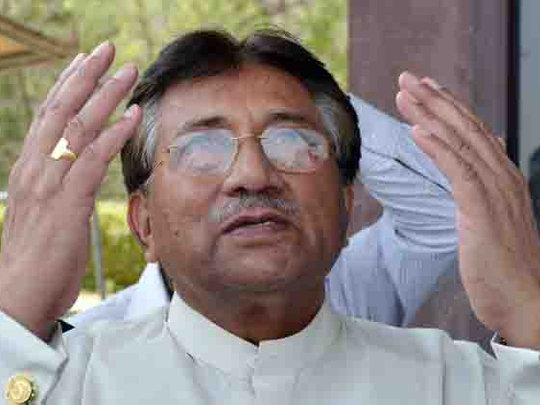
It has been another week of high drama in Islamabad. That of course is an oft repeated statement coming from Pakistan’s capital city — now used to one unprecedented event after another.
In the latest episode surrounding Pakistan’s politics, retired General Pervez Musharraf, the former president who ruled the country for nine years, not only found himself finally barred from contesting next month’s parliamentary elections but also facing arrest orders.
Yesterday, an Islamabad judge ordered him to remain in custody for the next 14 days, setting in motion an uncertain future for the former army commando. The latest drama began unfolding last Thursday, when the High Court in Islamabad ordered his arrest on the charge of overseeing the arrest of more than 60 judges in 2007, when he was president. Just a day later on Friday, Musharraf was formally arrested and abruptly transferred to the confines of a police facility in Islamabad — trading the comfort of his home in the upper class Chak Shehzad neighbourhood for a police lockup.
For Pakistan’s pro-democracy activists, this is a moment to cheer. The reality of a former powerful military general now forced to reconcile with his past is indeed an unprecedented occurrence in the country’s history.
The episode in question that has brought the latest twist to Musharraf’s future relates to his controversial decision of dismissing Iftikhar Mohammad Chaudhry as chief justice of the Supreme Court, in a manner that blew apart his claim of being more tolerant than the country’s politicians. Judges who defied Musharraf were taken in custody while protesting lawyers and journalist bore the brunt of the state’s force.
Yet, the cheer may be premature if juxtaposed against other more recent and major lapses in Pakistan’s political and democratic journey. The elections, which are due to take place on May 11 are being widely hailed by mainstream politicians as a historical moment of a political transition that is due to take place without the army’s interference.
Yet, the upcoming contest has been preceded by controversial candidates successfully entering the race and overshadowing the sanctity of the process. In the latest incident, Raja Pervez Ashraf, the former prime minister who had served under President Asif Ali Zardari, was first blocked from the race by the Election Commission. But coinciding with Musharraf’s high drama, the former prime minister was finally cleared to enter the contest, raising questions over the motive behind such a move.
Ashraf’s own history says much about the direction taken by Pakistan in the past five years. While serving as the minister of water and power, prior to becoming the prime minister, Ashraf became embroiled in allegations of kickbacks linked to a project for electricity generation plants brought in to Pakistan on rent to deal with long hours of power cuts. No doubt, the scandal led the Pakistani press to dub him “Raja rental”. For Pakistanis, memories of Ashraf’s failure to live up to his promises of quitting his job upon failure to deal with the electricity crisis, only underline the controversial nature of his tenure.
Moreover, his elevation to the prime minister’s post says much about the gap in Pakistan’s democracy. Ashraf stepped into the prime minister’s shoes after Yousuf Raza Gilani, his predecessor, was dismissed under orders from the Supreme Court after he refused to formally request Swiss authorities to reopen corruption-related investigations against Zardari.
Deep scars on the body fabric
And last but not the least, Zardari’s own political journey has raised many troubling questions. As president since 2008, more than half his tenure saw the elected ruling structure simply defy calls from different quarters to allow a reopening of corruption related investigations in Switzerland surrounding the president. In sharp contrast to the seriousness of the charges, the president’s immunity from prosecution was always used as a plea to keep him well protected.
On the streets too, the last five years have left deep scars on the body fabric of Pakistan. On the one hand, the ruling structure has simply failed to begin successfully tackling the scourge of terrorism that has engulfed the country for more than a decade. On the other hand, a widespread popular discontent with the rulers remains visible across the country as ordinary Pakistanis battle the fallout from one of the worst periods of economic decline in their country’s troubled history. A combination of such controversies has practically dried up new investments leaving ordinary Pakistanis with fewer job opportunities than before.
As Pakistan heads towards elections, nowhere is a sense of despair more palpable than across the country’s many poverty-stricken homes. While democracy in the shape of a civilian ruling structure is indeed vital to promote the cause of popular rights and freedom, that can just not be the ultimate objective.
A fragile order
If Musharraf is to be held accountable for his past deeds, the same yardstick must also be applied to other players in Pakistan’s politics. A failure to tighten the rules of the game for all across the board will keep the democratic order very fragile.
For the moment, many politicians are eager to cheer the first time ever of a parliament completing its tenure in March and setting the pace for a civilian transition through the upcoming elections. While that may be a promising event, the controversies surrounding some of the key political players are largely disappointing.
Going forward, Musharraf’s prosecution on its own will hardly help to move a progressive future political agenda.
In sharp contrast, raising the standards of accountability surrounding key politicians in their ability to participate in Pakistan’s politics will make a difference. On this latter front, news from Pakistan has hardly been encouraging in a week when a former army chief finally found himself in the dock for the first time ever.
Farhan Bokhari is a Pakistan-based commentator who writes on political and economic matters.









